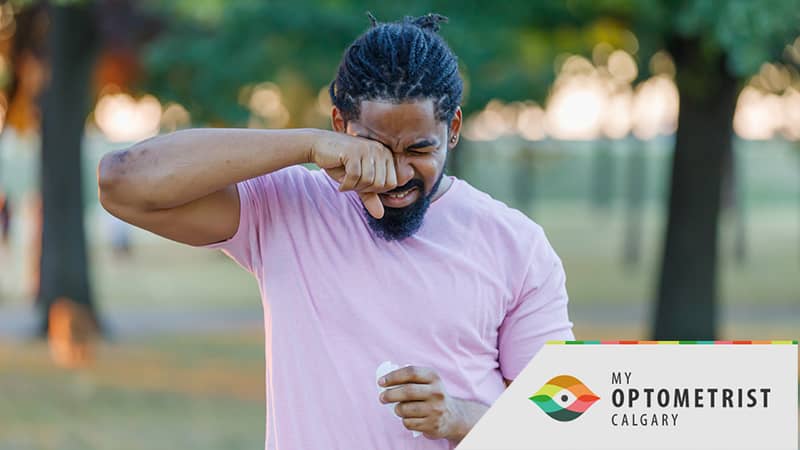
Springtime is full of new life as the snow melts and flowers start to bloom again. You would think everyone loves the spring, but for those with Dry Eye Syndrome (DES) the seasonal conditions often cause symptoms to worsen. DES occurs when there is insufficient lubrication in the eyes that causes the following symptoms:
- Eye redness
- Excessive tearing
- Burning sensation
- Sensitivity to light
- Aching sensation
- Eye irritation or fatigue
- Scratchy and itching feeling
- Dryness
- Blurred vision
- Mucus buildup
- Low tear production
DES symptoms are often worse in the springtime as there are many particles in the air that can trigger allergies and sufferers of DES do not have enough tears to clear the particles away. Even for those without allergies, these particles get into the eyes and cause irritation. Learn more about springtime dry eyes and how to combat the symptoms.
Seasonal Dry Eyes
When DES is triggered or worsened due to the season, it can be referred to as Seasonal Dry Eyes. This term can also be used for DES triggered by the dry, cold climate of the winter season. In springtime, seasonal dry eyes are largely caused by the amount of pollen, mold spores, and dust circulating in the air.
Pollen
Many people experience allergies in the springtime because of the high pollen count, but pollen can also affect those without allergies. The pollen count is at its highest in the springtime and those who live in an area with lots of trees and other foliage are at high risk for seasonal DES. While rain can help to flush pollen and dust away, it is often not enough to stop eye irritation.
Snow Mold
Pollen isn’t the only allergen in the air. When snow falls on ground that is not yet frozen, the live grass trapped beneath the snow will develop mold that becomes exposed in the springtime when the snow melts away. Many people are allergic to the spores of this snow mold and it can irritate the eyes. Similar to pollen, a large amount of snow mold will also irritate the eyes of those who may not have allergies.
Dust
Springtime is a shift between the dry Calgary winters and the wet, rainy springtime. This often means there is a period where dust kicks up, especially as snow melts and gravel that was put down to help vehicles on icy roads is now loose in the street. These particles, along with the air that is still low humidity at the start of spring, can further trigger DES symptoms.
What To Do About Seasonal DES
If your allergies are causing your dry eye symptoms to worsen, you may want to take antihistamines that block the body’s reaction to allergens. Decongestants can also help reduce allergy symptoms. Some people request a steroid eye drops prescription, but these should only be taken after a consultation with your doctor. Other ways to combat DES include taking breaks from tasks that can cause eyestrain, blinking more, and using artificial tears, lubricating ointments, Restasis® (a prescription medication), meibomian gland expression, warm compresses, cleansing wipes, or nutritional supplements. If your DES symptoms are present year-round, you can also ask your optometrist about punctal plugs, radiofrequency (RF) treatment, and Intense Pulsed Light (IPL) energy-based systems.
Receive Dry Eye Treatment This Spring
If you are suffering from the effects of Dry Eye Syndrome, seek dry eye treatment from the My Optometry Advanced Dry Eye Clinic. Our dry eye treatment clinic is focused on educating patients about Dry Eye Syndrome while offering high-quality dry eye treatment. At our dry eye clinic, we offer advanced treatments such as IPL and RF and we cater to each patient’s specific needs. To book an eye exam with one of our optometrists, contact My Optometrist at one of our three locations at Health First in SE Calgary, Sunridge in NE Calgary, or Three Hills, AB. You can also call us or fill out the online contact form.
FAQ
Q: Where can I find products to help ease the symptoms of my Dry Eye Syndrome?
A: My Optometry offers top-of-the-line products designed specifically for dry eye treatment. View them here.
Q: Is DES only associated with allergies?
A: No it is not. You can experience Dry Eye Syndrome year-round, but external irritants such as humidity, dust, pollen, mold, or wind can cause symptoms to worsen.
Q: How severe is my Dry Eye Syndrome?
A: If you want to assess the severity of your dry eyes before you come for dry eye treatment, you can take the dry eye quiz! Scroll to FAQ 9 on this page and simply fill out the questionare.